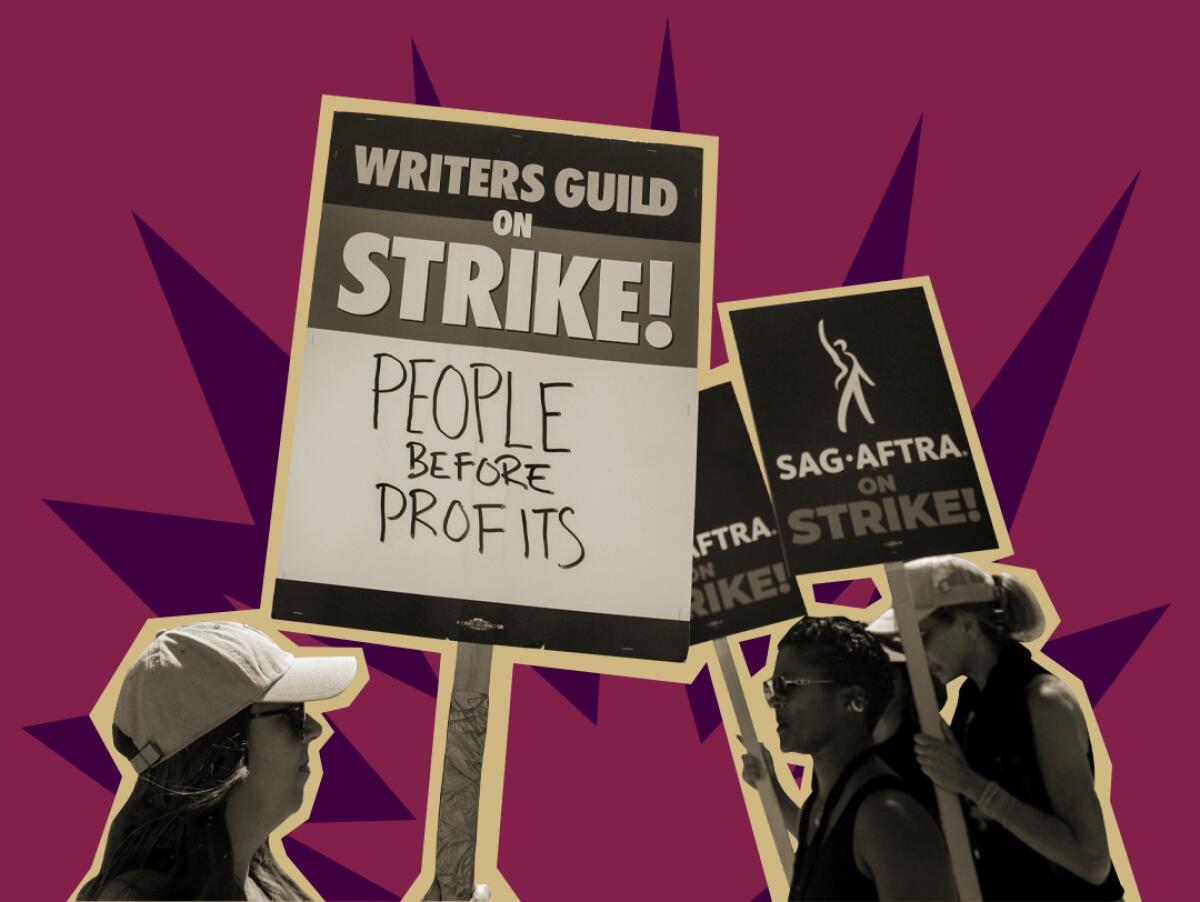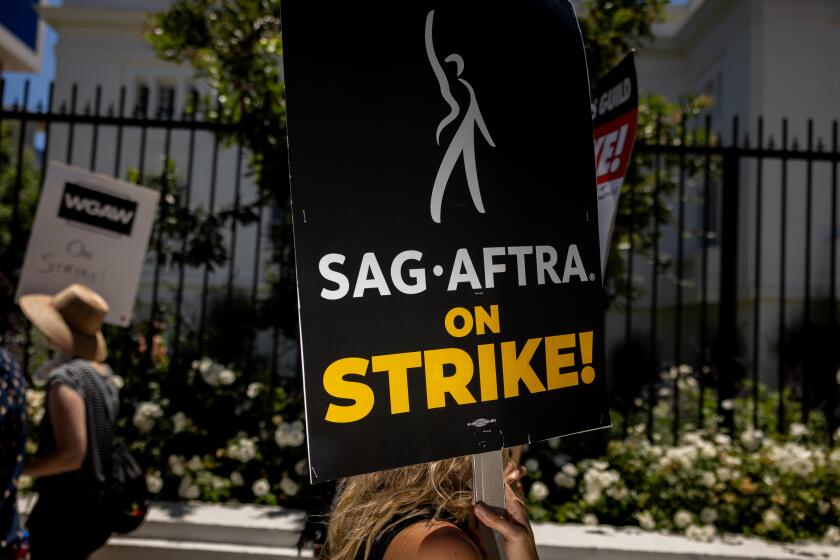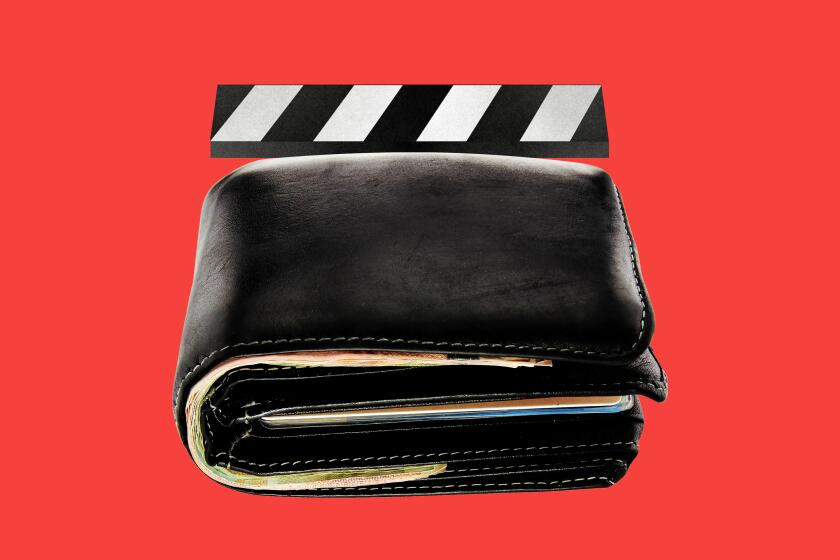Who will lead Hollywood out of its labor nightmare?

- Share via
Welcome to the Wide Shot, a newsletter about the business of entertainment. Sign up here to get it in your inbox.
Hollywood is in the business of making imaginary heroes.
It sure could use a real one right now.
Facing a double strike of writers and performers for the first time in six decades, the major studios are staring down a “hot labor summer” at the worst possible time, with the box office still reeling from the COVID-19 pandemic, profits under pressure from streaming and the pay-TV bundle unraveling faster than executives expected.
“The economics of the industry are very challenging — the worst that we’ve ever seen,” veteran media analyst Michael Nathanson told my colleague Meg James. “A prolonged strike will only make things worse.”
SAG-AFTRA President Fran Drescher, who just weeks ago was pilloried for appearing to be too soft on the studios, has emerged as a labor hardliner with her fiery speeches, energizing the passions of both actors and scribes in a key moment of the raging twin disputes.
Now the industry itself — made up in part by the studios and streamers at odds with the unions — needs a leader who can get the sides talking to each other again.
To understand why, one needs only to look at a Monday report from credit ratings agency Moody’s, which outlined the dire effects that could come from a long strike. As of now, no one really knows whether the additional leverage on the guilds’ side will bring studios back to the table more quickly or if it will entrench both camps in their respective positions.
A prolonged halt in film and TV production, already at a virtual standstill, would do the most damage to cinema operators that are already under stress because of lingering pandemic effects. Traditional television networks, which are in severe decline, will suffer from the lack of new original scripted shows.
Separately, Moody’s estimates that the new contracts that eventually emerge from the labor negotiations will cost the companies an additional $450 million to $600 million a year.
SAG-AFTRA has approved a deal from the studios to end its historic strike. The actors were on strike for more than 100 days.
But who among the studio executives could step up as a unifying force?
There needs to be some damage control, particularly after a Deadline article quoted an anonymous executive saying the endgame was to starve out the workers until they start losing their homes. That bit of verbal class warfare helped the strikers’ public relations cause as much as Drescher’s rhetorical swipes did.
A few years ago, the person waiting in the wings to save the day would have been Bob Iger. During the 2007-08 strike, Iger and Peter Chernin became the public face for the studios, taking hands-on roles in the negotiations.
But the Walt Disney Co. chief executive has now been cast by actors and writers as a villain in the strikes, after he told CNBC from the “billionaire summer camp” of Sun Valley that the unions’ demands were “just not realistic.” In the same interview, he showed how challenged Disney’s business is, by indicating he would be open to spinning off its broadcast network, ABC, and taking on a partner for ESPN.
Iger could still play a pivotal role once the heightened rhetoric tamps down, considering Disney is among the companies with the most to lose from an endless stalemate. If there’s another candidate to be Hollywood’s philosopher king who can lead the industry out of this nightmare, that person has not yet emerged.
Warner Bros. Discovery CEO David Zaslav had already become a symbol of severe job cuts and excessive executive pay.
A Times survey tallies the paydays for the heads of Warner Bros. Discovery, Netflix and more. The issue has become a hot topic on picket lines during the writers’ strike.
Media and tech mogul Barry Diller, who ran Paramount and Fox decades ago, set a new standard for what might be “realistic” when he suggested that the top paid actors and executives should take a 25% pay cut as a “good-faith measure” for working actors. Nope, not going to happen.
It’s become conventional wisdom among executives and producers that Netflix and its co-CEO Ted Sarandos hold the most power on the studio side. While the Alliance of Motion Picture and Television Producers has maintained a united front, there’s little doubt the Los Gatos, Calif.-based streaming giant is in a position of strength compared with its compatriots.
The stock price is up more than 50% so far this year. The company has signaled a strong stockpile of content to keep subscribers entertained and analysts are expecting a windfall from its password-sharing crackdown.
In contrast, since the writers’ strike began in May, the share prices of legacy media companies Disney, Paramount and Warner Bros. Discovery have taken a hit.
It’s unclear how Sarandos will address the strike when Netflix reports earnings Wednesday afternoon. During his last quarterly presentation, which took place before the Writers Guild of America walkout, Sarandos said Netflix would be able to withstand a strike “better than most,” though he noted that the company wanted to avoid a work stoppage.
Now that the strike has not only happened but escalated more than expected, Sarandos has a unique chance to take on an even greater role in Hollywood.
Inside the business of entertainment
The Wide Shot brings you news, analysis and insights on everything from streaming wars to production — and what it all means for the future.
You may occasionally receive promotional content from the Los Angeles Times.
Of course, the company could use this as a way to sharpen its competitive edge over the legacy media players. Netflix’s rivals spent the last few years losing billions of dollars by launching their own direct-to-consumer apps to earn the love Wall Street bestowed on the largest streamer.
The company with the famed red logo may not have the most incentive to end this hellish summer, which has in some corners been dubbed “the Netflix strike.” But it might be in the best position to do so. And let’s be clear: The strike is hurting everyone, Netflix included, even if the stock doesn’t reflect that reality. Ending a strike is no best picture Oscar, but it’s close enough.
Our strike coverage:
— Dangerous heat wave during ‘hot labor summer’ — how picketing workers brave the sun
— Can actors go to movie premieres and film festivals? Here’s what’s allowed during a strike
— What to know about an actors’ strike: Five questions answered
— As actors go on strike, these films and TV shows are likely to shut down
— Hollywood actors join WGA in historic double strike. ‘This is all of our fight’
— Actors said they were making progress in contract talks, then they weren’t. What happened?
More top stories
— High-profile exits spark fears that Hollywood diversity pledges are just ‘PR.’ Alongside conservative attacks on ‘woke’ entertainment, equity advocates call the departure of four key Hollywood diversity executives ‘frightening.’
— Response from Sacramento: California lawmakers want answers after exit of Black Hollywood female executives.
— Inside the world of L.A.’s gym-fluencer ecosystem. Exclusive L.A. gyms have turned exercise — a sweaty, uncomfortable experience for most people — into content primed for public consumption
— ICYMI: Looks like Microsoft’s $69-billion purchase of Activision Blizzard will close, after the Federal Trade Commission’s attempts to block the deal failed.
Number of the week

With a five-day domestic opening weekend box office of $80 million, “Mission: Impossible — Dead Reckoning Part One” is the latest big-budget tentpole to debut softer than expected.
“Mission: Impossible” could have legs because of glowing reviews and positive feedback from audiences. Also, the franchise is highly dependent on international box office grosses, and those numbers are strong. That $291-million budget, though, will take a while to overcome.
But the results do raise a question of whether there are too many movies going after a similar demographic. “Mission: Impossible” is a series that appeals largely to adult men, an audience that is over-served right now in theaters. The opening weekend attendance was about 60% male for “Dead Reckoning.” “Indiana Jones and the Dial of Destiny,” “Transformers: Rise of the Beasts” and “The Flash” all underperformed.
No wonder “Barbie” is expected to explode.
Best of the web
— The disastrous Oppenheimer movie you’ve never heard of. (Mother Jones)
— Instagram’s Threads proves that social media is fated to repeat a cycle of life and death. (The Atlantic)
— The innovative and daring show “Orange Is the New Black” was a worldwide hit for Netflix, but some of the actors say they were never fairly compensated. (The New Yorker)
— The remarkable run of the child-trafficking movie “Sound of Freedom.” (The New York Times)
— AI may kill us all, but it will never write a good movie. (Vanity Fair)
Finally ...
A great story on the 40th anniversary of “Reading Rainbow.” This made me happy.
The Wide Shot is going to Sundance!
We’re sending daily dispatches from Park City throughout the festival’s first weekend. Sign up here for all things Sundance, plus a regular diet of news, analysis and insights on the business of Hollywood, from streaming wars to production.
You may occasionally receive promotional content from the Los Angeles Times.






